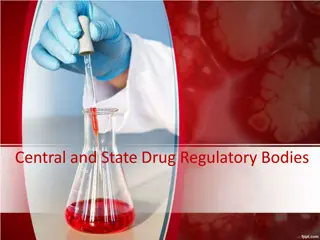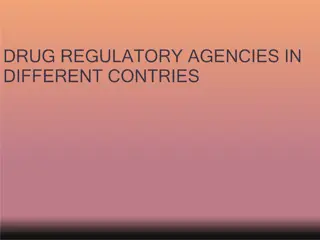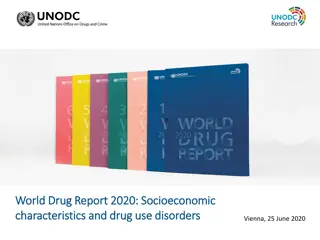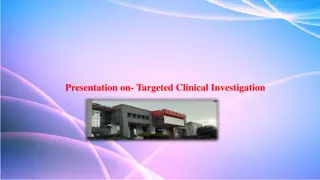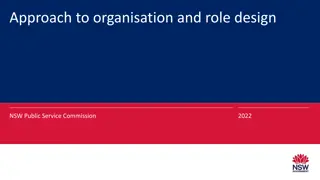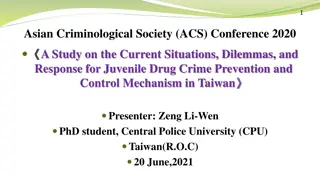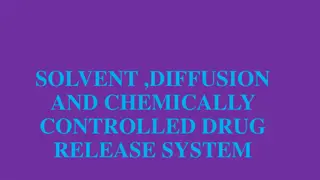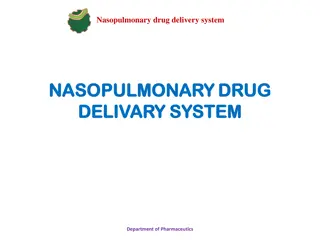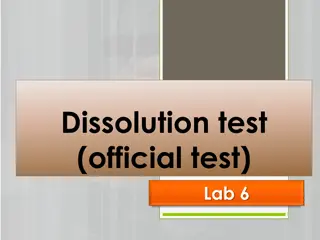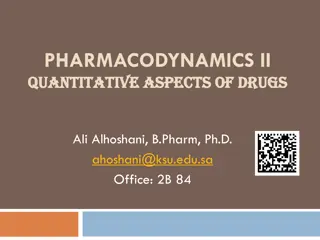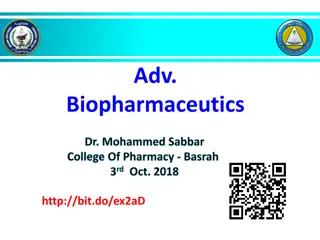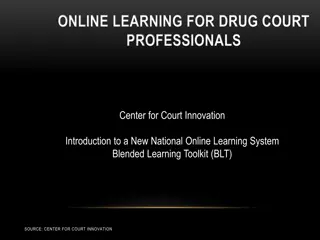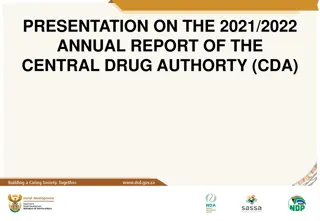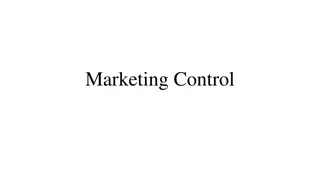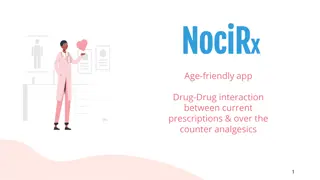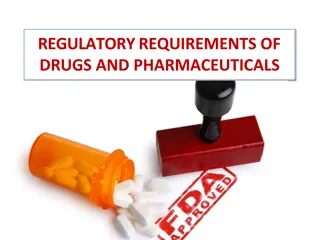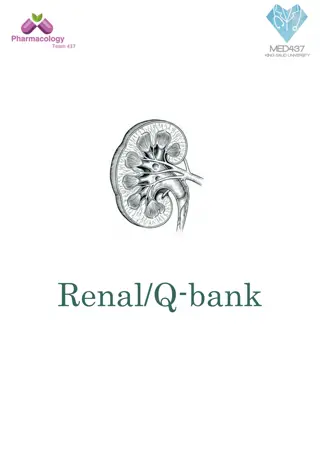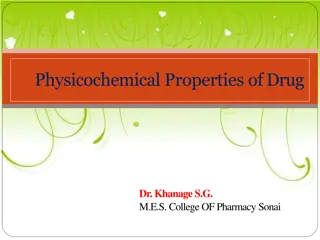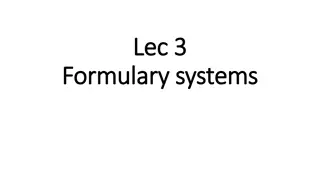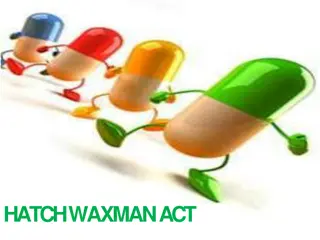Overview of Central Drug Standard Control Organisation (CDSCO) in India
The Central Drug Standard Control Organisation (CDSCO) is the main regulatory body in India for pharmaceuticals, medical devices, and clinical trials. It functions under the Directorate General of Health Services, Ministry of Health and Family Welfare, Government of India. The CDSCO is responsible for the approval of new drugs, medical devices, and clinical trials, with the Drugs Controller General of India (DCGI) playing a key role. The organization has zonal offices in major cities such as Mumbai, Kolkata, and Chennai, along with sub-zonal offices for coordination with state drug control authorities. Additionally, there are central drugs testing laboratories across the country for quality control of drugs and cosmetics.
Download Presentation

Please find below an Image/Link to download the presentation.
The content on the website is provided AS IS for your information and personal use only. It may not be sold, licensed, or shared on other websites without obtaining consent from the author. Download presentation by click this link. If you encounter any issues during the download, it is possible that the publisher has removed the file from their server.
E N D
Presentation Transcript
CENTRAL DRUG STANDARD CONTROL ORGANISATION (CDSCO) Dr. IVL Padmini Department of Pharmaceutics
INTRODUCTION The CDSCO of India is main regulatory body for regulation of pharmaceutical, medical devices and Clinical Trials. Head office of CDSCO is located in NEW DELHI and functioning under the control of Directorate General of Health Services, ministry of health and family welfare Government of India.
Drugs Controller General of India [DCGI] He/she is a responsible for approval of New Drugs, Medical devices and Clinical Trails to be conducted in India. He is appointed by the central government under the DCGI the State drug control organization will be functioning. The DCGI is advised by the Drug Technical Advisory Board {DTAB} and the Drug Consultative Committed {DCC}.
Organization Chart SUB ZONAL OFFICE(3) LABORATIES(6) HEADQUATER ZONAL OFFICE(6) PORT/AIRPORT OFFICE(7) NEWDRUGS CLAA Imports DTAB/DCC Import Export Testing of drugsamples Validation of testprotocols GMPAudits Coordination with states GMPAudits Coordination with states
Zonal offices Mumbai Kolkata Chennai Ghaziabad Ahemdabad Hyderabad These are involved in GMP audits and inspection of manufacturing units of large volume parental, sera, vaccine and blood products.
Sub-zonal office:- I. Chandigarh II. Jammu III. Bangalore These centre co-ordinate with state drug control authorities under their jurisdiction for uniform standard of inspection and enforcement.
Central Drugs Testing Laboratories Central Drug Laboratory, Kolkata Central Drug Testing Laboratory, Mumbai Central Drug Testing Laboratory, Chennai Central Drug Laboratory, Kasauli Regional Drug Testing Laboratory, Guwahati Regional Drug Testing Laboratory, Chandigarh These laboratories are responsible for quality control of drugs and cosmetics in the country.
Functions of CDSCO in Center Approval of new drugs and clinicaltrials. Import Registration and Licensing Licensing of Blood Banks, LVPs, Vaccines, r-DNA products and some Medical devices and Diagnostic agents. Amendment to D&C Act and Rules. Participation in WHO GMPcertification schemes.
Functions of CDSCO in Center Banning of drugs and cosmetics. Grant to test license, personal license, NOC s for export. Testing of drugs by Central Labs. Publication of IndianPharmacopoeia. Monitoring adverse drug reactions. Guidance on Technicalmatters.
STATE DRUGS CONTROL ORGINATION DRUGSCONTROLLER/COMMISSIONER DRUGS TESTING LABORATORY DEPUTY DRUGS CONTROLLER GOVT.ANALYST DRUG INSPECTOR ANALYST SUPPORTINGSTAFF SUPPORTING STAFF
Function of State Licensing Authorities Licensing of drug testing laboratories. Approval of drug manufacture. Monitoring of quality of Drugs and manufactured by respective marketed in the state. formulation for cosmetics, state and those
Function of State Licensing Authorities Investigation and prosecution in respect of contravention in respect of contravention of legal provisions. Administrative actions. Pre- and post- licensing inspection. Recall of sub-standard drugs.
Approval For New Drugs New drugs are permitted to be marketed in country in accordance with the permission granted by DCGI after ensuring that these drugs are Safe Effective Comply with requirement of schedule Y of the Drug and Cosmetic rules.
Applicants are required to provide technical data in respect of safety and efficacy before could be permitted to be marketed in country. Definition of new drug also includes fixed dose combination which are required to be marketed for the 1st time incountry. these
Clinical Trials Schedule Y of drugs and cosmetics act explain the guideline for grant of permission for clinical trials in India. The protocol for such trials are examined by the office of DCGI before the permission are granted. Office of DCGI also grants permission for conducting bioequivalence studies. conducting
a. Registration of clinical trials has been made mandatory with centralized clinical trial registry of ICMR with effect from 15th2009. b. Drug and Cosmetic rules are being amended to make mandatory the registration of clinical research organizations. c. Drug and Cosmetic act is proposed to be amended to include a separate chapter on clinical trials.
MEDICAL DEVICES Any instrument, apparatus,implement appliance, implant, invitro reagent diagnosis, treatment of a disorder. machine, used for


